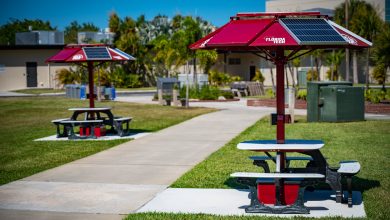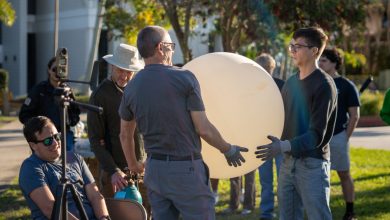Senior Design Showcase – a venue for all of the senior projects: aerospace, biomedical, chemical, civil, computer, mechanical, and ocean engineering
Senior Design Showcase – By Dr. Stephen Wood – a venue for all of the senior projects across campus to be shown to the world: aerospace, biomedical, civil, mechanical, and ocean engineering students present their completed designs to the community on April 20th 2012.
The largest of the systems are by the Ocean Engineering students.
- The Flume, (Naval Architeture) a structure measuring 25 feet long, 9 feet wide and 9 feet tall (Project e-FLOW) – a test platform for testing the flow dynamics of hull forms and underwater vehicles. The e-FLOW design apparatus is to study full scale autonomous and remotely operated vehicles being developed by the Underwater Technologies Lab at Florida Tech, where submerged vehicles 2m in length require test velocities of 1-1.5 m/s and surface vessel hulls requiring speeds of 2.5-5 m/s. The testing apparatus is portable to the extent it can be moved by means of public roads if deemed necessary. The design consists of a self contained recirculation tank with a test channel width of 2m, depth of 1.5 m, and testing channel length of 18 ft that will be powered by an electrically driven submerged Tesla disk wheel. Students: Tom Bruger, Spencer Jenkins, Chris Scott, William Beldon, Clayton Stone, Ben Scheffer;
- The GECCO (Ocean Energy) measuring 30 feet long, 3 feet high and 15 feet wide – is made up of three, ten-foot sections of fiberglass pipe connected by two joints that bend vertically. As a wave passes, hydraulic rams that are connected to the joints will compress, pressurizing hydraulic fluid that will accumulate in an accumulator. Similarly, two pairs of ducks will be attached next to the joints that will oscillate horizontally in a back and forth motion. The ducks will be connected to a one way bearing driving internal pumps that pump hydraulic fluid into the same accumulator. Once the accumulator reaches a maximum pressure the fluid will be released and drive turbine creating electricity. The estimated weight of the system is about 3,016 lbs with a 1 ft. draft. Students: Virginia Hutton, Jeremy Sirois, Heather Weitzner, Christopher Ellert, Luis Maristany, Nicole Waters;
- The Ocean Crawler (Remotely Operated Vehicles), small by comparison to the other two projects measures 10 feet long, 3 and a half feet tall and 6 feet wide. (Project ROSCo) Remotely Operated Sea Crawler (R.O.S.C.o) is the new underwater vehicle concept in development at Florida Tech. R.O.S.C.o is a high-powered remotely-operated vehicle with the ability to take on a wide range of underwater excavation projects. R.O.S.C.o’s underwater capabilities include the removal of waste equivalent in weight to a full 55-gallon drum and the recovery of lost valuables. R.O.S.C.o will be operational in a variety of terrain in coastal waters at depths up to 300 feet. With the addition of instrumentation, it will also be capable of surveying and profiling. You will be seeing this vehicle in the news as it gets modified next year for underwater archeological studies in the Bahamas and off the coast of Honduras. Students: Justin Ellingham, Zach Kowalski, Chloe Mallet, Travis Pumphrey.
– Ocean Engineering –
The application of Mechanical, Civil, Electrical and Computer Engineering and applied to the oceans.
See you at the Senior Design Showcase this April 20th














